Public Policy Internship Placements
While classroom training and preparation is critical to the future success of our students, our BA in Public Policy also focuses on field experience for our students. Our faculty have extensive relationships with a wide range of government agencies and institutions, university administration, nonprofits, foundations and even for-profits who see the impact of public policy on their business. The success of our students depends on our ability to help them grow their social capital through volunteering on and off campus, securing internships that provide meaningful engagement, and finally landing a field placement that provides real-world training for their future graduate and career paths.
Internship Placements
Ryan Walsh
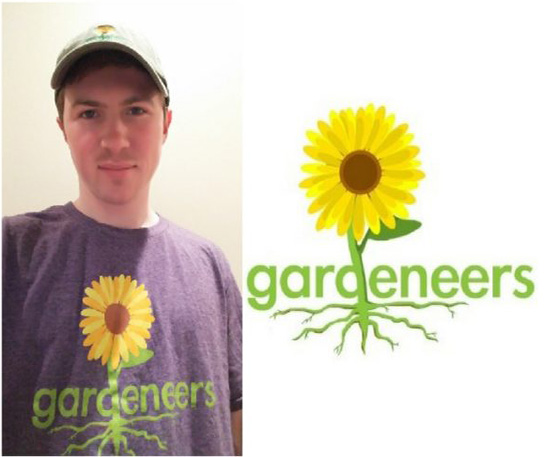
“I am interning at a nonprofit called ‘Gardeneers’. This organization cultivates school garden programs to allow kids to connect with healthy food. They work primarily in schools on the South and West sides of Chicago in neighborhoods where people have limited access to fresh, healthy food, often referred to as ‘food deserts’. I am teaching 1st through sixth graders three days a week at Smyth Elementary, which is located just South of UIC on Roosevelt and Blue Island. I wanted to get involved with Gardeneers because I believe that access to healthy food is a right and not a privilege. Allowing kids to connect with healthy food makes me feel like I’m doing something good for the city that I love.”
– Ryan Walsh
Joe Barnas
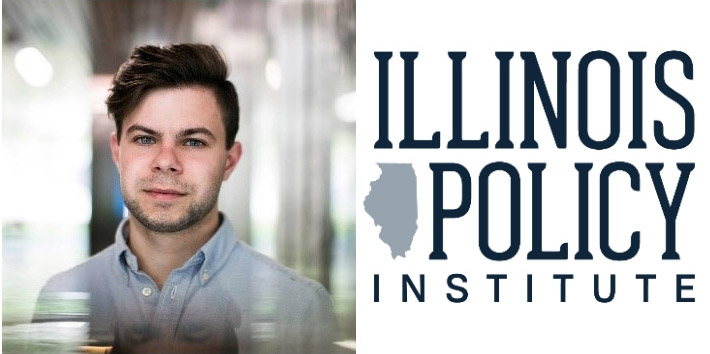
“For the past few semesters, I interned at the Illinois Policy Institute (IPI). The mission of IPI is to generate public policy solutions that promote personal freedom and prosperity, through free markets and limited taxation. My tasks fell into one or a combination of three areas: writing, research, and story-telling. Other work spanned policy and public finance research, from researching onerous Halloween ordinances in Illinois, calculating taxpayer subsidies for a suburban entertainment venue, to recent trends in Illinois SNAP enrollment. I also helped tell the stories of everyday Illinoisans and help amplify their voices regarding policy issues. At UIC, courses in economics and public policy provided knowledge that prepared me, but my internship showed me how little I knew about state policy – and enhanced my knowledge through field experience. Research, blog-writing, and petitions are all part of a larger legislative push combined with social activism. This was strongly underscored in Prof. Yang-Clayton’s Nonprofit Organizations course (PPOL 490), something I did not fully appreciate until I became part of the process.”
– Joe Barnas
Ivan Cazarin
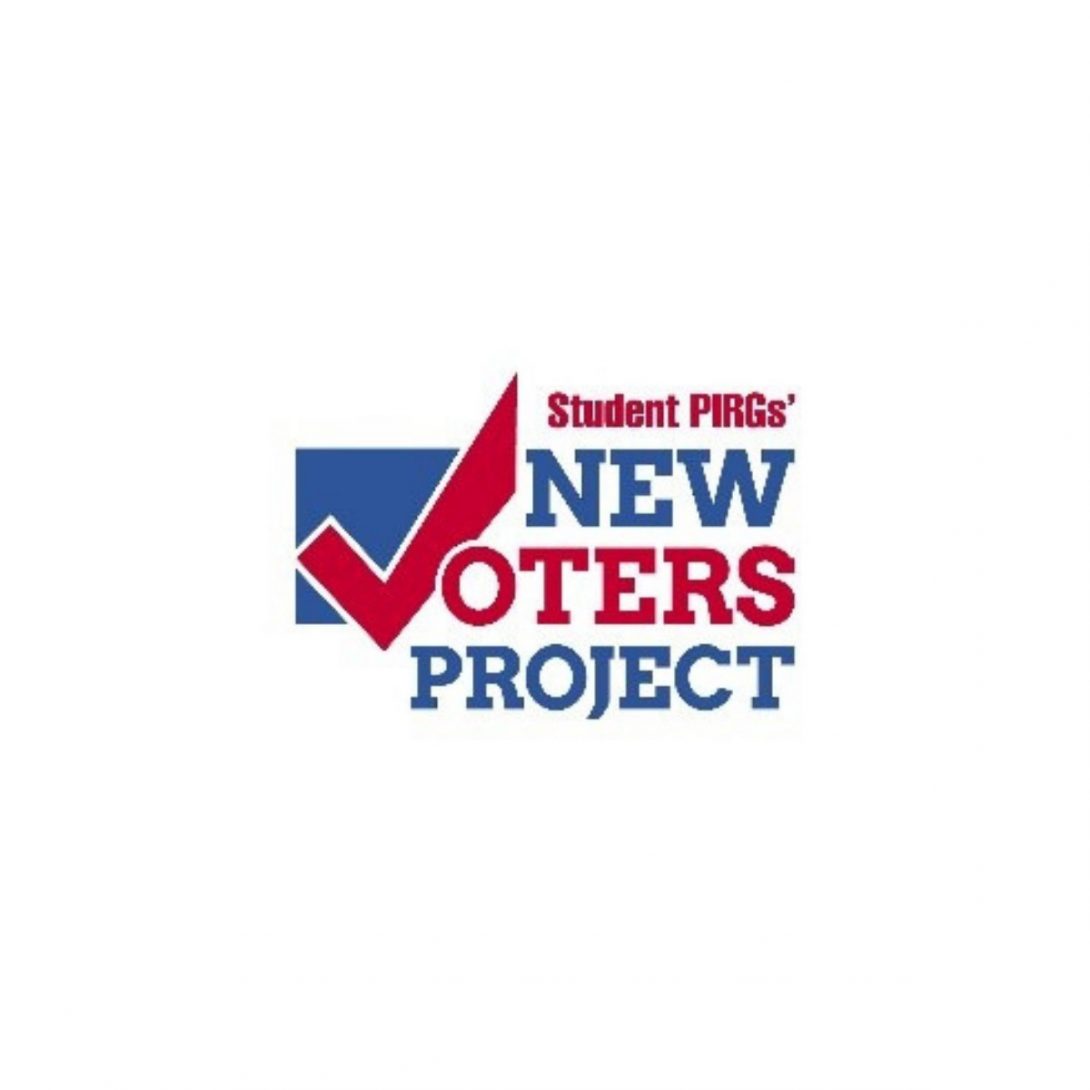
“This fall, I interned with Illinois Public Interest Research Group (PIRG) and The New Voters Project. The project was looking to increase voter registration and turnouts within the UIC student population. This appealed to me because it demonstrated a way for me to get directly involved in addressing the issue of a more representative electorate. I liked the hands-on experience of labeling and branding the internship gave me for my own future organizing ventures. Knowing how to capture an audience is important and my Public Policy 100 class taught me the importance of framing behind organizing to expand/ control your appeal to an audience. I did some visibility work within the program and my class experiences helped me to think of my information distribution techniques in a much more specialized way.”
– Ivan Cazarin
Jessica Pitts
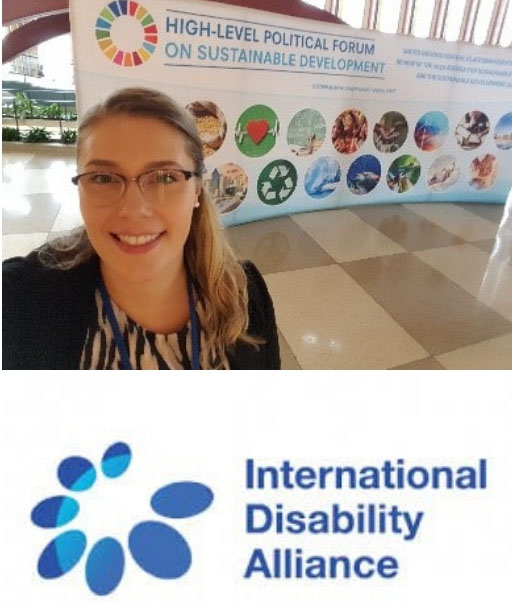
“During the Summer of 2018, I packed up my bags and moved from Chicago to New York City to start an internship with a nonprofit called International Disability Alliance (IDA). The founder of the nonprofit is a UIC PhD student in the Department of Disability and Human Development, and I found out about the organization during a guest lecture. Their greatest focus is to advocate for the rights of persons with disabilities in the United Nations, specifically in the areas of human rights and sustainable development. I was very interested in working with this organization when I learned about the work that they do because I have been curious on what disability policy advocacy looks like at an international level. I provided a lot of administrative support, such as scheduling, event planning, creating documents and spreadsheets, tracking information, and coordinating logistics for participants. I also reviewed policy documents and made suggestions for where we might want to include persons with disabilities. I used skills that I learned in my policy classes to write interventions that were short and succinct. I was also able to better understand the policy making process that had been taught in some of my Policy Theory courses.”
– Jessica Pitts
Ashal Yai
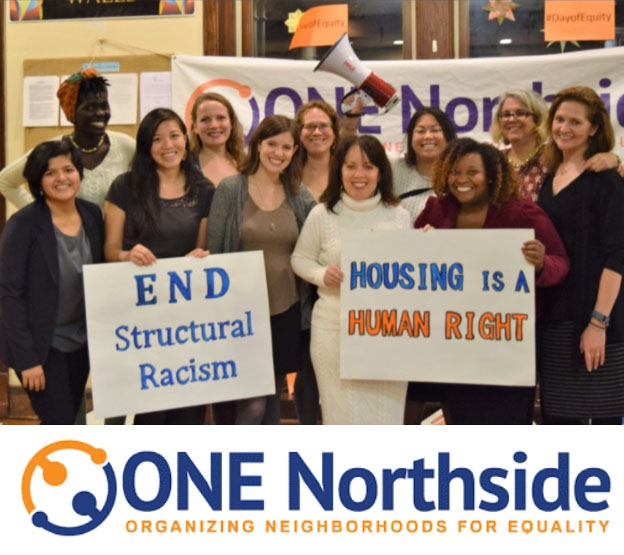
“This semester I had the pleasure of having my field placement at ONE Northside, a nonprofit located in Uptown that uses organizing as a tool to create change. ONE Northside brings people together based on shared values of diversity, justice, leadership development and people push for reform on social justice issues including affordable housing, economic justice, education, mental health justice, and police accountability. Community Organizing is by far one of the most dynamic positions I’ve ever held, and part of the reason why I am eager to get involved with a community I care for. I was canvassing for almost three times a week building capacity for the organization (I.e. knocking on doors, making phone calls, petitioning street corners). With time, I grew my niche of what worked for me and how to maintain the relationships I was gaining. I learned that the solution was not to back out, it was to push my own boundaries of learning new information, utilizing my networks, and looking at failures as learning lessons or areas of improvement.”
– Ashal Yai
Austin Zamundio
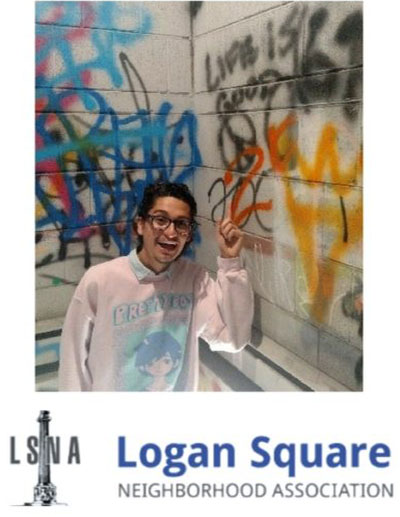
“Currently, I’m working with the Logan Square Neighborhood Association (LSNA) on their Brown in Chicago fellowship. This past summer I was involved with LSNA as an HR intern where I helped oversee many of the youth groups that were a part of Mayor Emmanuel’s One Summer Chicago program. I chose to stay with LSNA because of their mission to fight for affordable housing on the northwest side and the team is made up of such inviting people. The main focus of being a Brown in Chicago fellow is to work on decolonizing out identities and break down what it really means to be a person of Latinx descent in Chicago. We worked closely with a genealogist and took ancestry tests to put our identities into perspective. Right now we are putting together presentations about issues that are personal to us; mine is about internalized racism and how it has manifested in my family through generations. I love LSNA because we know what we’re about, we take control of our identities, and we are unapologetically brown!”
– Austin Zamundio
Michael Yucuis
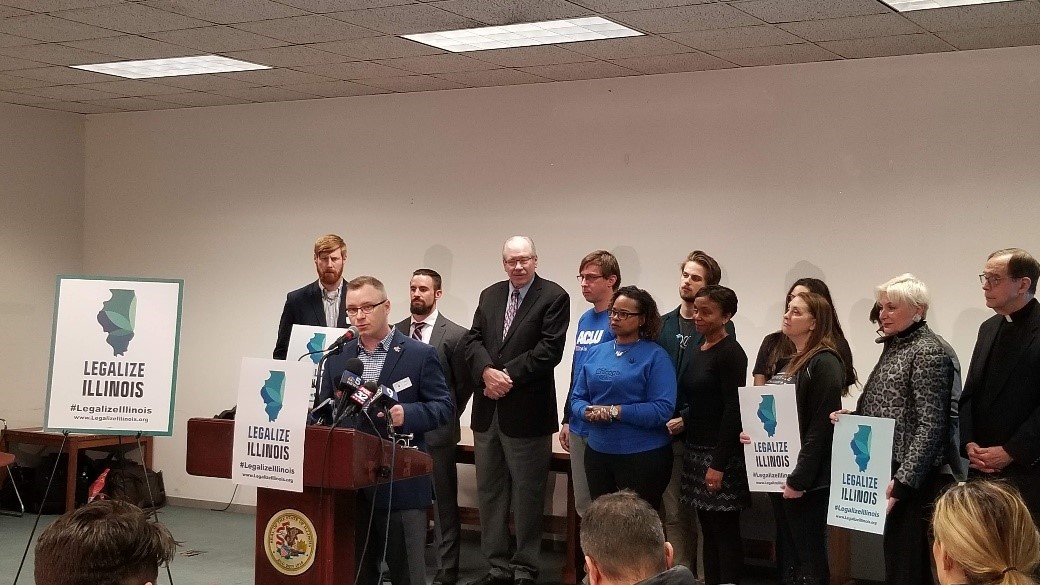
“Shortly after the semester started I received a call from one of my oldest Air Force friends—actually the first person I met after finishing technical training in 2004—and told me that he came across a local nascent veteran nonprofit called Operation 1620 that was working to increase cannabis-access and -education opportunities in Illinois and other states. They did not know what to prioritize or how to go about developing a fundraising plan that met their needs, especially since they were still stuck in the world of bake- and t-shirt-sales. Despite my diverse experience on the bake-sale circuit and running small nonprofit Air Force groups, this was an entirely new challenge for me. Since getting out in 2018 and joining CUPPA, I have also gotten really good at writing memos and analyzing policy. Still, this felt different. Our director received a call from State Senator Steans office indicating they wanted a veteran voice on the Legalize Illinois campaign that was scheduled to kick-off in the spring. I went from crafting a donor strategy and engaging with the cannabis industry to co-brand products to support our Operation 1620 to participating on working groups and providing feedback to campaign staffers and planners on how best to push through cannabis legalization in Illinois. I am working with advocacy organizations like Black United Fund, Students for Sensible Drug Policy, and Clergy for a New Drug Policy, and larger labor organizations like the SEIU. I am proud to say that the bill was just released. I have certainly learned in the last few months that if you are willing to carry some water for people and stand behind a rather big governor, all kinds of opportunities present themselves.”
-Michael Yucuis
Denver Justine Lively-Hatcher
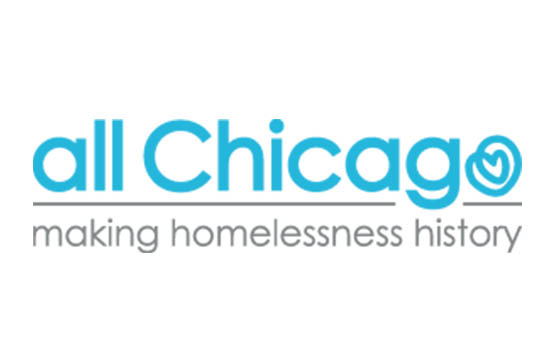
“I was pleased to work with the largest provider of homeless services in the Midwest, Catholic Charities. To prepare I was trained in HMIS (Homeless Management Information System) in order to become a Skilled Accessor through AllChicago. An organization that now manages the HUD-mandated Continuum of Care program formerly run by the city. These trainings prepared me to meet with houseless people to complete vulnerability indexes, map their housing history, and find out more about their situation in the context of placing them in housing. Once in this HMIS system, people are put on the radar of every shelter and homeless services program in the city until they are matched with a meaningful situation for them. Entering people into this system was the primary role I took on, making regular appearances at Catholic Charites meals, as well as going to any number of places that served the houseless population and needed a Skilled Accessor to meet with folks who had not yet been reached. I want my future policy work to be grounded in a personal history with the communities I aim to serve and have a network of people who I can look to for resources. Having only moved to Chicago last Autumn, and having worked with homeless populations in the past, I chose this position in order to familiarize myself with the landscape of services in my new city. This internship offered me exactly those things, relationships with people who make things happen and knowledge of how to emulate change myself.”
-Denver Justine Lively-Hatcher
Alan Marquez Valdiviezo
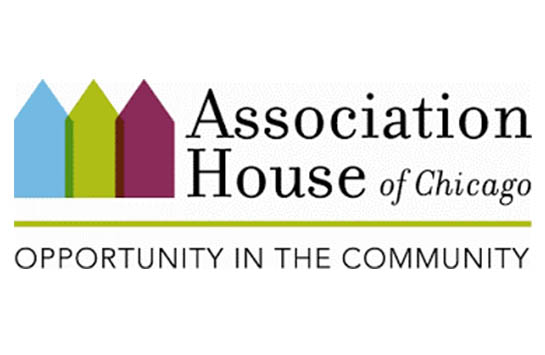
“Association House of Chicago was a great opportunity for me to teach elderly people to connect and get familiar with technology, such as navigating on internet, the important use of email and the creation of one, the detailed description of a computer and its functions. The internship was of great practice on presenting information in front of a class and the responsibility of providing current scenarios connecting situations with programs being taught. The training for the internship was interesting, they showed me what type of language shouldn’t be used with people, behaviors to avoid, how to identify abuse on elderly people and what to do. This world keeps changing and technology plays a big role in it. For me, teaching people to be part of that change was of great satisfaction. It also makes me think about more programs and more support we can have for elderly people to still be part of the constant change in technology.”
-Alan Marquez Valdiviezo
Ashour Lazar
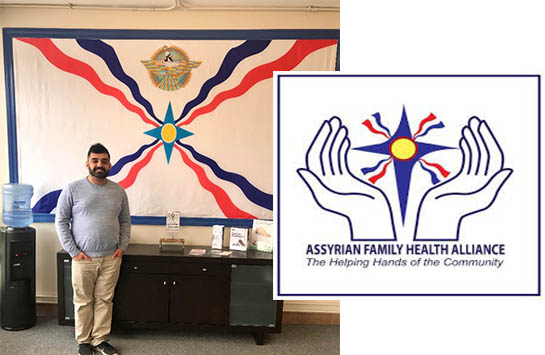
“My internship took place at the Assyrian Family Health Alliance a nonprofit organization a colleague and I founded in 2014. We founded the Alliance after seeing a surge of our Assyrian community immigrating, as refugees, to the United States to avoid persecution by terrorist groups in the Middle East. The goal was to assist clients with navigating the United States healthcare system. Navigating the healthcare system is complex, especially when someone is new to the country and in the process of learning the English language, culture, the “how-to,” et al. Services I assisted with ranged from the simplicity of making an appointment for a client to finding drug copay financial assistance for patients. Several classes come to mind while I am working to serve clients, Nonprofit Organizations in US Society and the American Safety Net. These classes taught me the history of nonprofits in the United States. I also learned the different types of nonprofits which exist in the United States. The Topics in Management and Leadership class has awakened me to my leadership skills and strengthen them to become a better leader. Finally, the Managing Government Partnerships has opened my mind on how we can better collaborate with government entities to help communities in a mutually beneficial manner.”
-Ashour Lazar
LaCreshia Birts
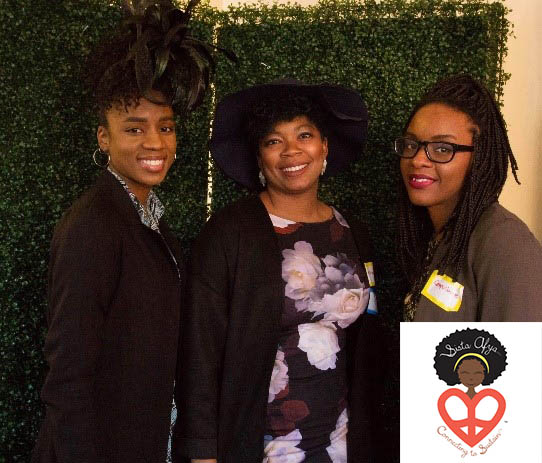
“Sista Afya is a social enterprise founded by Camesha Jones, a Licensed Social Worker. The agency resides in Chicago and specifically provides mental health services to Black women. While traditional mental health agencies focus on direct service, Sista Afya tackles mental health care with a four-prong approach: 1) education, 2) direct support, 3) connection to mental health resources, and 4) the selling of mental wellness merchandise. The agency is most known for its sister support groups and special mental wellness workshops. As an intern of Sista Afya, I am tasked with logistical support, data entry, organizational outreach, and research. Logistically, I support the agency with the set-up of workshops and events. I also log and analyze data gathered from consumer surveys. In addition, I work remotely to identify and catalog potential organizations and populations that might be interested in Sista Afya’s services. In the summer months, I plan to follow up with prospective clientele groups. Lastly, the majority of my time is spent researching the mental health sector in Chicago and formulating mental health policy recommendations. I learned that public policy skills are applicable to all sectors–not just the public sector. As a public policy student, I am trained to diagnose, describe, and treat big problems. To do this, I must gather information and consider alternative solutions. Through my work with Sista Afya, I realize that these policy skills can be applied to the internal infrastructure of organizations and businesses, to analyze user data and make recommendations about how to enhance services and improve operations. My hope is that working with the agency will enable me to learn more about the process of obtaining public-private-partnerships. I’m also interested in learning how to duplicate and bring the work of successful private entities to scale in the public sector.”
-LaCreshia Birts
Sophie O'Connor
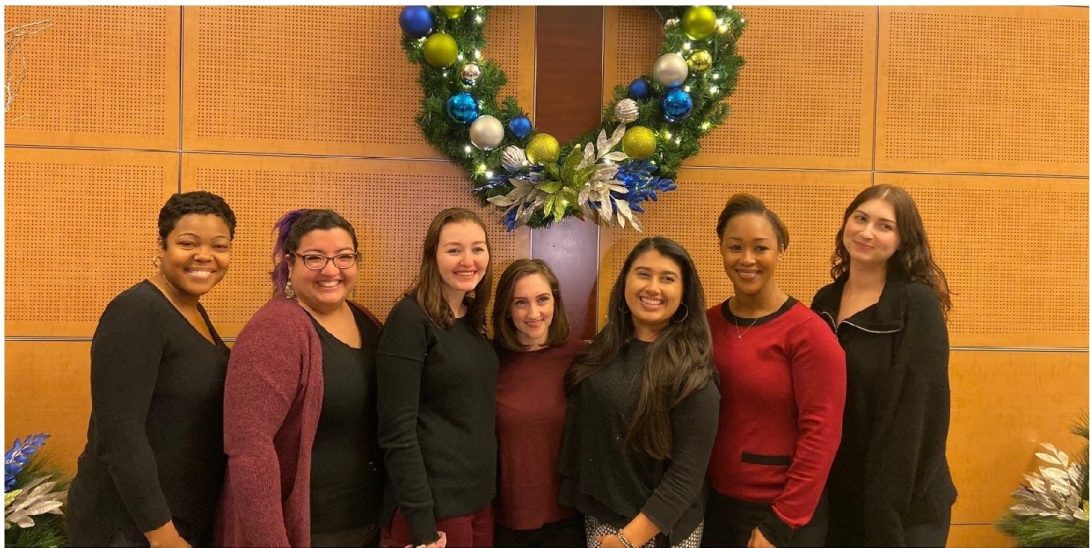
“During the Fall 2019 semester, I interned at Peer Health Exchange Chicago, a nonprofit that brings trauma-informed, skills-based health curriculum to high school students in Chicago Public Schools using a near-peer model. PHE trains college student volunteers to be health educators in high school classrooms to give students the skills they need to make healthy and informed decisions on issues such as drugs and alcohol, sexual health, and mental health. During my field placement, I was a program intern and supported the program managers with cohort assignments, writing weekly Monday emails to students and teachers, and testing tech kits. I also attended weekly staff meetings and learned so much about nonprofit management, external affairs, and how each team effectively collaborates with one another to foster a greater impact on the community they serve.
-Sophie O’Connor
Iyana Simba
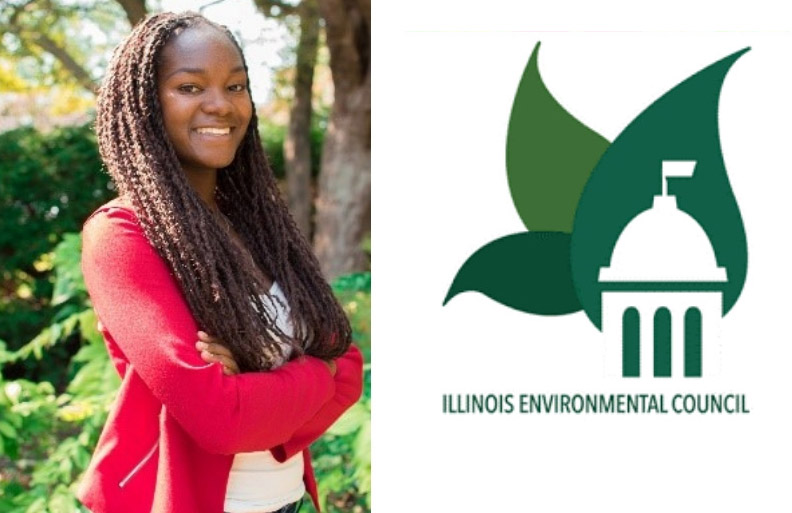
“Since June 2018, I have interned at the Illinois Environmental Council (IEC). IEC’s mission is to unite environmental organizations in Illinois in order to create a strong, unified voice in Springfield. I was attracted to IEC’s mission because of the importance of policy in environmental protection especially under the current political climate. My role as an intern is primarily to assist the staff with administrative tasks and projects. Beyond administrative work, I also work on continuous policy related assignments. One of the most difficult projects I was assigned was to research energy storage technology. Afterward, I evaluated survey responses using qualitative analysis skills I acquired from Public Policy (PPOL) 405: Evaluating Public Policies.”
– Iyana Simba
Elizabeth Flores
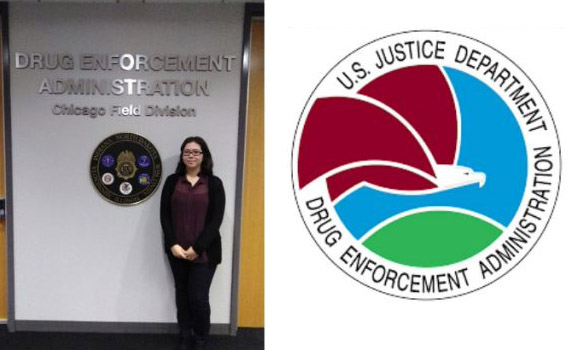
“I interned with The Drug Enforcement Administration (DEA) which, is a law enforcement agency under the Department of Justice and has one mission area: to enforce the controlled substances laws and regulations of the United States. Being Mexican American and having family in Mexico, I am aware of the drug trafficking problems relating to cartels and gangs in Mexico and Central America. I appeal to the DEA’s mission because they try their best to help individuals and families abroad, and in the U.S from violence and corruption from the war on drugs. One of the few projects I’ve worked on was to find and conclude the most updated data from four Illinois counties regarding the opioid crisis for the Intelligence Unit in the DEA Chicago Division. Public Policy (PPOL) 210: Introduction to Policy Process, exposed me to different policy issues and without it, I would’ve never found the issues happening on Central America that relate to the DEA and the Department of State. Being an intern for the DEA and having this knowledge allowed me to ask questions and further my investigations on certain topics in the criminal justice system and policy areas.”
– Elizabeth Flores
David Shipyor

“For the summer of 2018, I interned at the Village of Justice, a municipality in the southwest suburbs of Chicago. While interning at the village, the tasks delegated to me were divided into two main areas, the first being routine clerical work and the second to assist in the formation of municipal ordinances. As with all municipalities in suburban Cook County, Justice has several vacant or abandoned properties that the village must maintain to prevent urban blight. My task for the summer was to assist in codifying a list of processes and procedures for ensuring proper handling and filing of such maintenance cases was performed so that the municipality could recuperate costs for work done through the lien process. Skills learned for research and critical thinking played a crucial role in navigating both state and county municipal codes to ensure all projects and inquiries were properly addressed. All such skills that were enhanced through time spent in public policy courses taken at the university. Additionally, skills and thinking processes learned through public management courses played a role in how to conduct professional workplace duties and proved to be invaluable.” – David Shipyor
Liam Millerick
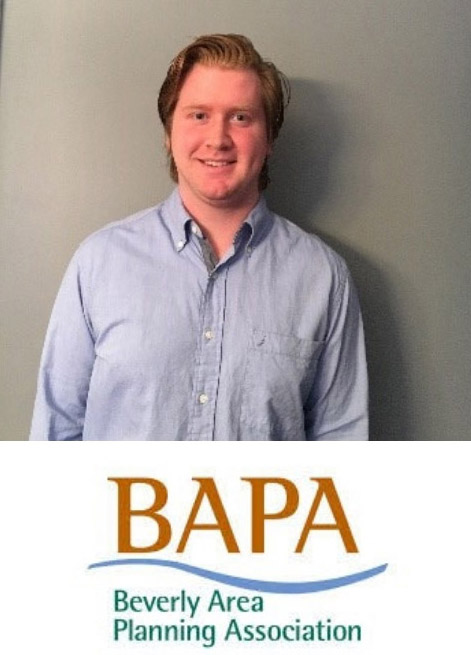
“Over the summer, I was fortunate enough to work at the Beverly Area Planning Association (BAPA), located in the Beverly neighborhood on Chicago’s Southwest Side. The mission of this nonprofit is to sustain and enhance the area with increasing home values, high-quality schools, and a low crime rate. One thing I learned in my public policy class that helped me figure out was creating a system of neighborhood advocacy. This would allow BAPA to more effectively help community members wishing to take on challenges with complex and challenging paths, by keeping formally and remotely keeping tabs on these projects, while at the same time adjusting and improving on our own methods. I, having just come from learning the policy process, proposed drafting our own system from this model. They accepted and implemented this, and as of now our policy process model-based system for keeping track of ongoing community complaints and projects has been a success.”
– Liam Millerick
Matt Amann
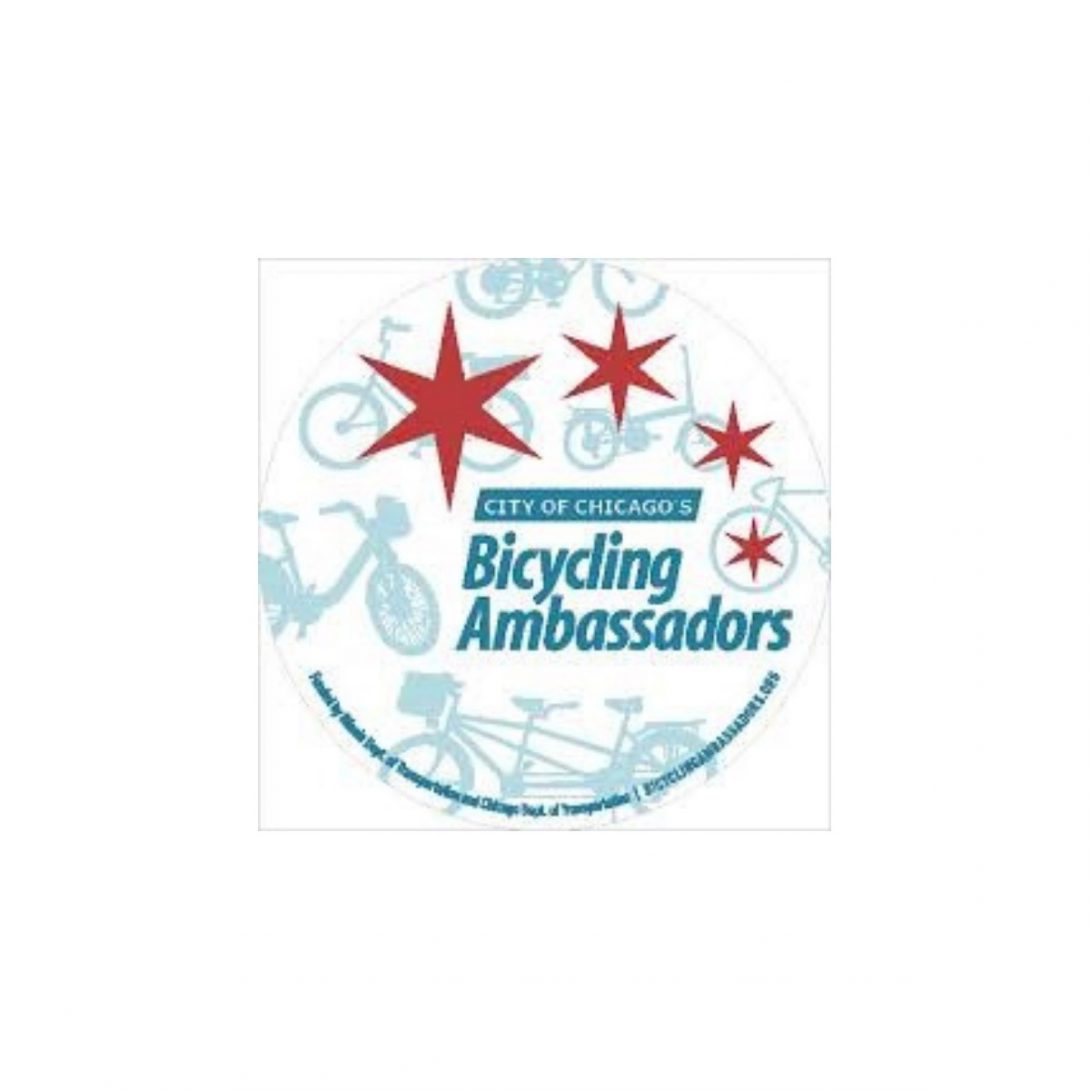
“The mission of the Bicycle Ambassadors is to promote walking, biking, and using transit, and to do so safely. We were required to live out these goals, which means that we had to travel to every event either on bike or via the CTA, and if we were cycling, wear helmets and always follow the rules of the road. I have been cycling in the city since I first moved here in 2009, and I found this to be a great way to participate in the promotion of something that I truly believe is good for everyone. Aside from the “general outreach” that we would do in places where people would congregate outside (e.g. street festivals and farmers’ markets and the lakefront trail). The group rides we did in tandem with Slow Roll Chicago and DIVVY were an incredible way to promote the reality of cycling to adults. These rides were very safe and low pressure, helping participants to recognize the great potential of including cycling in their lives.”
– Matt Amann
Mariana Perdomo
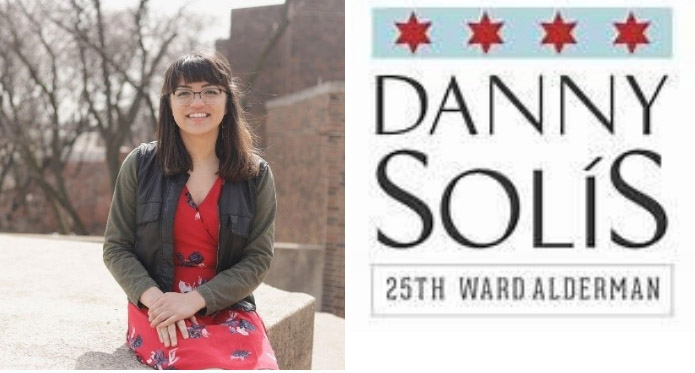
“I am currently an undergraduate student at the University of Chicago working on my Bachelors; in Public Policy with a focus on education. Most of my work related to advocacy has been through non-profits who I have learned to love and appreciate all the work they do. However, this past semester I learned to intern at the office of Alderman Danny Solis in order to learn more about how local government works and to learn the ropes of local government. Since I already have a solid background of what there is to expect in a non-profit and how it works, my internship at this site was very interesting. I had the chance to see new policy proposals for programs we already have and the power of an alderman whit in a community. I also had the opportunity to meet a lot of people through networking opportunities within the 25th ward.”
– Mariana Perdomo
Dmitri McDonald
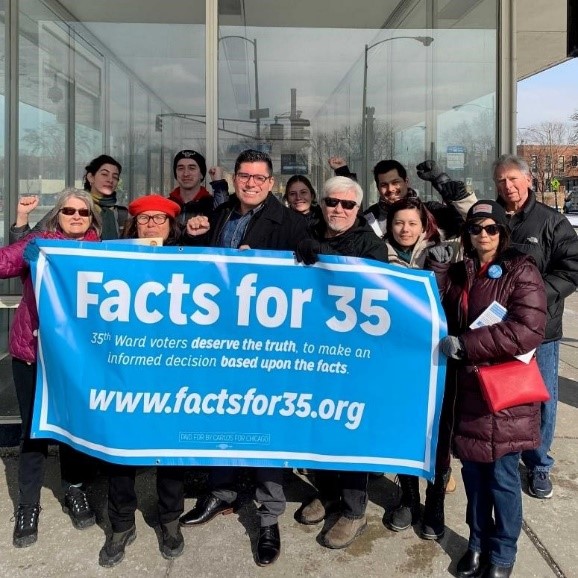
“For my internship placement, I have worked for the last six months as part of the 35th ward of Chicago’s constituent service staff. I was attracted to the position because I wanted to learn firsthand how residents interact with municipal policies. On a day-to-day basis, I answer phone calls and resolve constituent concerns through the 311 system and by collaborating with staff members from other city agencies. These are mostly mundane issues like getting streetlights and potholes fixed, but they are important in order to have a functioning city. Overall, the experience of this internship has been invaluable. I really have learned more about local policy implementation by working in the alderman’s office than I have in four semesters of class. What the experience has shown me is that the ward system in Chicago is inefficient, but it has also shown me that within this environment, it is possible to govern in a way that maximizes responsiveness and transparency to constituents. In the last few weeks of my internship, I have been working with my supervisor to develop spreadsheets of common constituent service requests, which city departments are responsible for addressing them, and best practices to follow to resolve these constituent requests. The intent is to share the information with all of the incoming progressive alderman so that we can ensure that more wards in the city adopt the inclusive, responsive, and transparent style of leadership that I have experienced in the 35th ward.”
-Dmitri McDonald
Mariana Perdomo
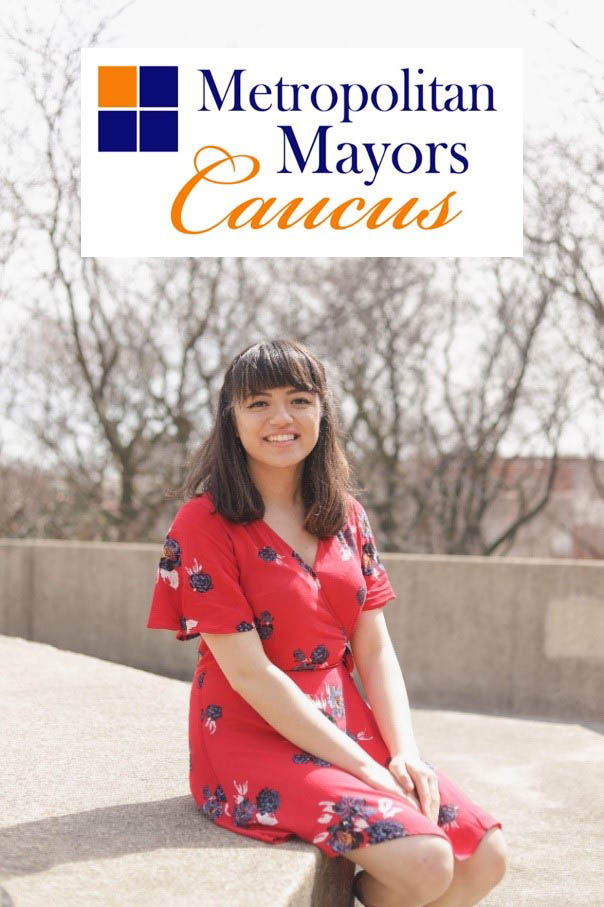
I have had the privilege and pleasure of joining the dedicated team of leaders at the Metropolitan Mayors’ Caucus. The Metropolitan Mayors Caucus works as an informal organization that serves the metropolitan area and they work as a forum to discuss public policy issues while setting aside geographical boundaries and local interest. Part of the role that the caucus takes on is being an outreach provider to connect municipalities to work together and stay informed on the latest policies as well as offer grant program information. My role consisted of working alongside Brian Tomkins MMC’s Project manager in assisting him with updating data to the Salesforce portal regarding the Powering safe Communities Program. I was also given the task of developing media content for social media usage to inform the public about the GRCorp members working in several municipalities, as well as develop memos for meetings with municipality mayors to inform them about what it means to be an “Age-Friendly Community” and what steps are entailed in that process. While working with MMC I have learned how to use various platforms of software and gained knowledge about the hierarchal structure of the inner workings or municipalities, as well as how grant programs work from the providers end. One of the reasons I was attracted to this organization was because their work is more of a think-tank based that offers the proper resources and tools for stakeholders to be well informed and it is unbiased, I was also attracted to this organization because it serves surrounding areas of Chicago to improve the quality of life for many residents.”
Shairoz Charania
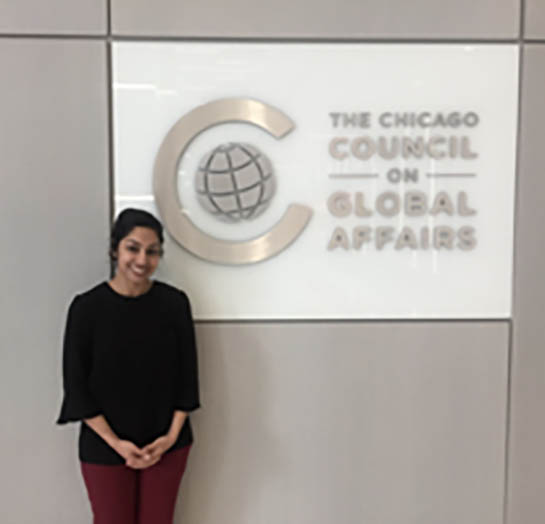
I had the opportunity to spend my time interning at The Chicago Council on Global Affairs. The Council, as it is referred to at times, as a nonpartisan think tank that informs the public about global issues. By producing research, inviting expert speakers, and sparking discussions it continues to inform citizens about foreign policy from different professionals. My days were spent working with a close team of four people consisting of the Major Gifts Director and Individual Giving Officers. I enjoyed working in the Development department because I was exposed to networking skills through membership events. I attended events where I learned how to spark conversations with strangers in a professional environment. The Council has succeeded in influencing policy by placing recommendations in front of elected officials several times. Three days a week, I work on updating donor information, creating reports tracking membership activity, and drafting brief summaries. Every other week, I and other interns from different departments would sit down with higher staff members from the Council to speak about our future career and seek advice. These open discussions were insightful in drawing out the Councils mission as well as each employee’s individual purpose in the organization. My time at the think tank was more than I could have ever hoped for. The opportunities I received to speak with scholars and professionals about foreign policy constantly motivated me. Thank you to The Chicago Council on Global Affairs for an impactful semester.”
-Shairoz Charania
Brenton Boitse
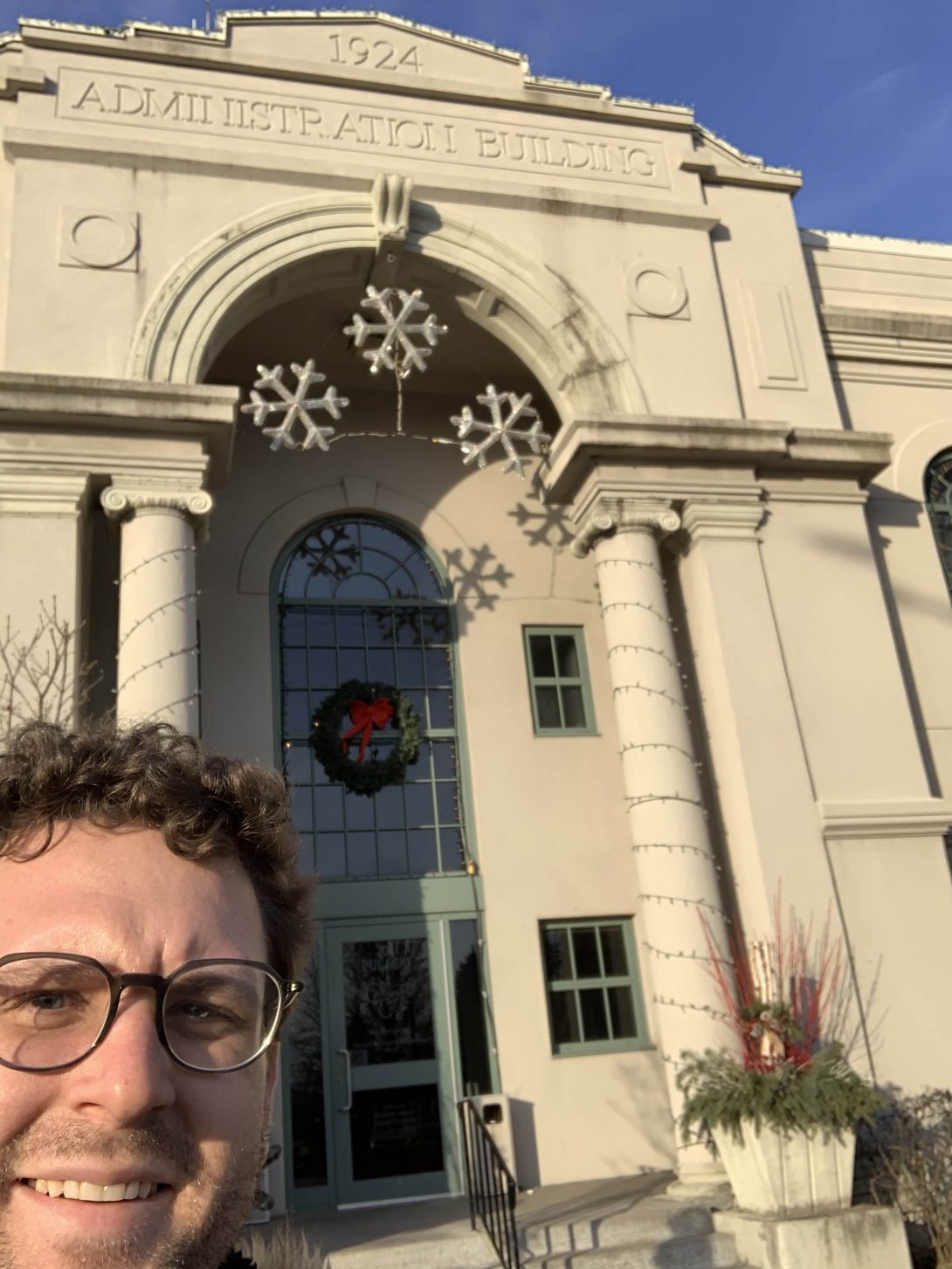
My internship was with Great Cities Institute and I was sent to work with Calumet City. Like many cities that are struggling to make ends meet, Calumet City has lost population, jobs, and a sustainable tax base. I was assigned to help write their comprehensive plan, that cities write about every five years. I was assigned to work on the potential plan for the TIF, in the hopes of generating money for development. I first updated the entire database, then afterward I realized not only would this work but my class Political Economy of Urban Development showed me that research shows that TIFs never really work anyway, so I am now making an entirely new plan that is proposing a huge new option. I meet with the mayor every other week and I am writing a new economic policy that is focused on the residents, not on attracting businesses and creating more equitable economic growth.
-Brenton Boitse
Ariana Correa
“In June 2019 I began my internship for the Office of the Lieutenant Governor within the Justice, Equity, and Opportunity (JEO) Initiative. The JEO Initiative centralizes the state’s criminal justice reform efforts and promotes economic opportunity in communities most impacted by a broken criminal justice system. The office’s internship positions are offered year-round and also includes the areas of policy, outreach, communications and legal affairs. As the JEO intern I conducted research, drafted policy briefs and memorandums to inform staff on bill signings, community programs, and policy issues regarding systems involved individuals. I also coordinated meetings between the Director of the Justice, Equity, and Opportunity Initiative and stakeholders/community members. My supervisor emphasized finding a time for these meetings that best worked for me because I was a full-time student while interning part-time. I was given the opportunity to attend and engage in meetings with stakeholders and community members to advance the agenda of the Justice, Equity and Opportunity Initiative. I was given the liberty of asking questions and providing my input during meetings. On November, I was hired part-time as the office’s Program Manager for the Justice, Equity, and Opportunity Initiative and I graduate on December 14, 2019.”
– Ariana Correa
Lillian McFarland
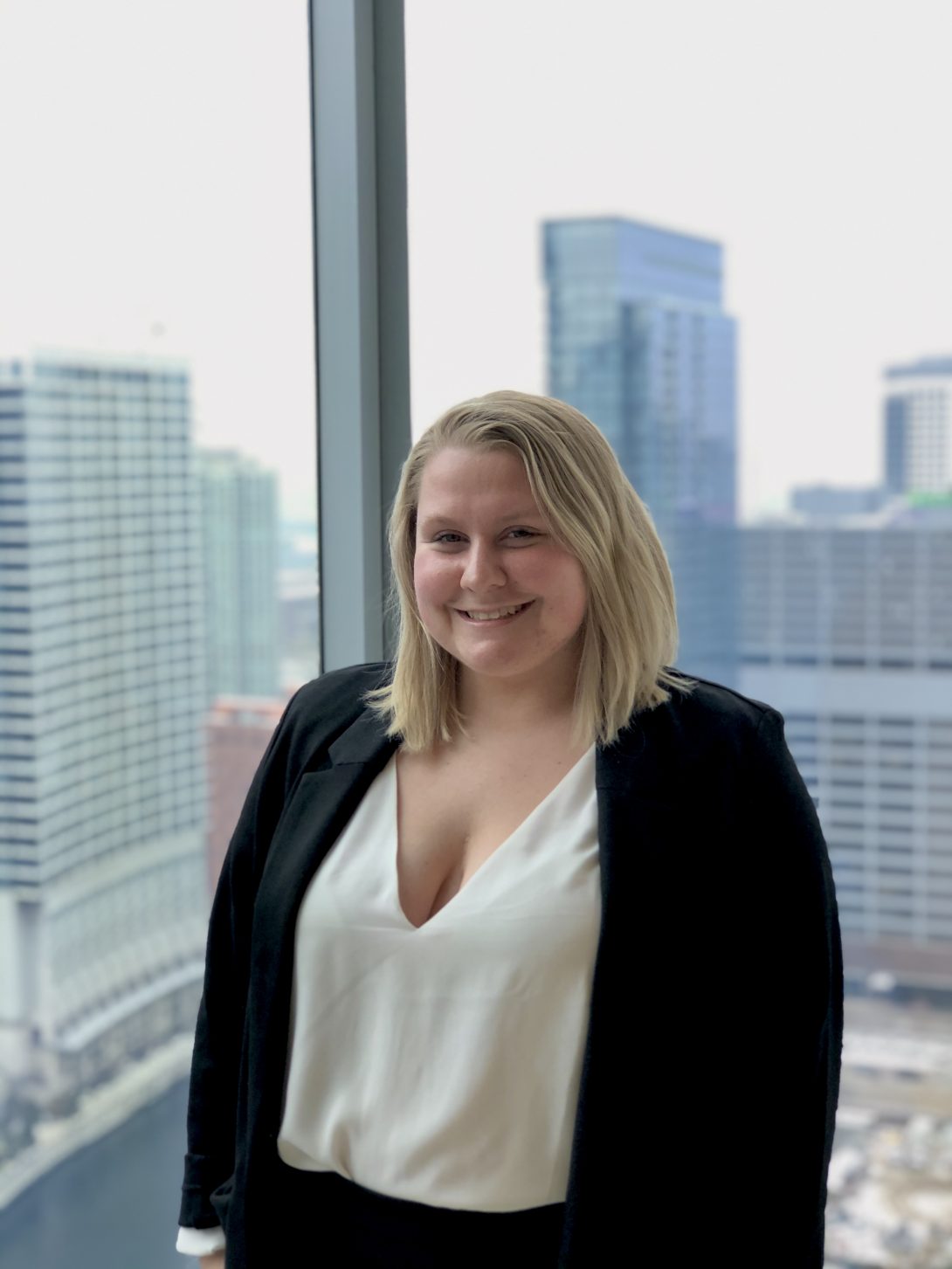
“During the Fall 2019 semester, I was participating in an internship program with the Office of the City Clerk of Chicago. I was a Public Policy Intern with the Policy team, spending the term researching policies, attending meetings, and building a relationship with other passionate public servants that work for the City of Chicago. Overall, I had an incredible experience that allowed me to grow immensely in my skills and I had the privilege of applying many of the concepts we learn in our Public Policy courses to real-world situations.
A majority of my time in this position was spent working on two major initiatives that were created by the Office of the City Clerk prior to my start date. These two initiatives, the Status of Women and Girls in the City of Chicago and Accessing Equity: Fines and Fees Reform, were the ideal way for me to begin navigating progressive policy-making within a bureaucratic agency. Over the course of my time with the OCC, I wrote 5 policy memos on topics related to the city-wide initiatives, connected the office with community and non-profit organization partners, and even wrote a fundraising plan for an event that the OCC hopes to launch in 2020.
Overall, the most rewarding part of this program was the amount of creative agency I had when completing each of my assignments. I was allowed to explore different ways to write a policy memo, receiving feedback on which ones were best suited for my current position. From the beginning, I was asked what I would like to take from the position, and my role was ultimately built upon the areas in which I expressed needing growth. The atmosphere of the office was inviting and fun, and I never really struggled to stay motivated knowing I had such an incredibly supportive staff standing behind me.”
-Lillian McFarland
Leslie Rios
“I had the opportunity to intern for the office of State Representative Kathleen Willis who serves Illinois District 77. Willis has served this district since 2012, which includes all or some parts of the areas of Franklin Park, Addison, Bellwood, Bensenville, Maywood, Northlake, Stone Park, Melrose Park and Wood Dale. The state Rep. is known to host various community events yearly. As an advocate for long-term tax relief for homeowners, she held a Property Tax Appeals Seminar in June 2019. Free and open to all local residents, this event was organized to help residents learn a step-by-step process to appeal their property tax assessments. Bilingual services were also provided at this event for non-english speaking residents. A couple of months later, the state Rep. organized another free event for the public. Willis has also focused efforts on environmental awareness, compelling her to host an annual community shred day. In collaboration with State Senator Don Harmon and the Cook County Sheriff’s recycling program, this event allowed for local residents to bring any old documents that contain personally identifiable information to shred as well the opportunity to recycle items, such as electronics, magazines, prescription drugs, and cardboard boxes. According to Willis, this event was aimed at providing residents with a safe way to get rid of important documents without having to worry about identity theft.”
-Leslie Rios
Mallory Vetter
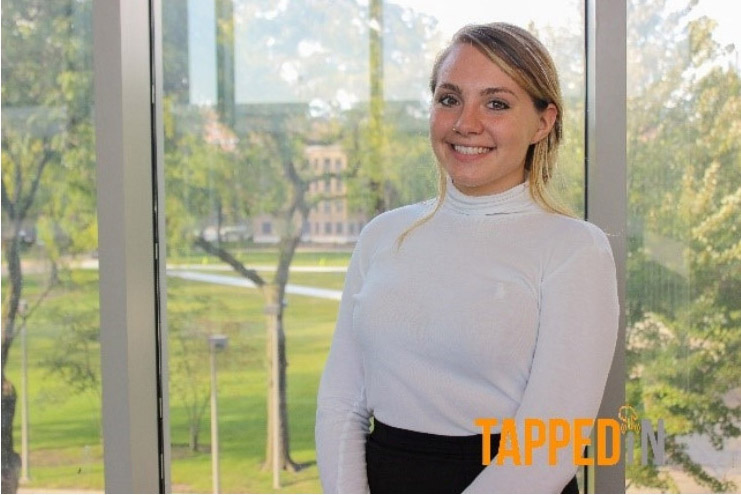
“For a few months, I served as a marketing and communications intern for Tapped Innovations (TappedIn), a local WiFi-based marketing and analytics startup focused on improving the technological quality of various bars and restaurants in Chicago. Within this role, I accomplished many tasks like developing and maintaining the online presence for over a dozen different clients in the hospitality and entertainment industry. I also analyzed quantitative and qualitative data from various marketing campaigns and performed extensive research into the industry in order to provide actionable advice for client success. At the end of my term, I was extended a full-time offer as Client Success Manager and have been working here ever since. My absolute favorite part about this occupation is the nontraditional, startup culture. I could never picture myself working a traditional 9am-5pm job in a cubicle for the next fifty years of my life. My position at TappedIn allows me the freedom to work whenever and wherever I choose. My long-term goal is to use the knowledge and experience gained from working at TappedIn to provide marketing and modern technological resources to organizations within the public sector.”
– Mallory Vetter
Sief Salameh
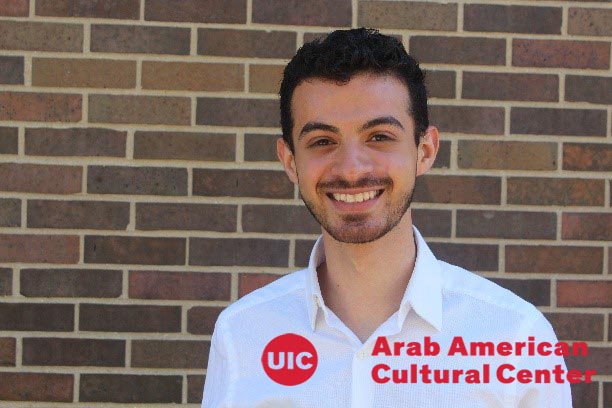
“During my time at the Arab American Cultural Center at UIC, I’ve spent the past several months working as the outreach coordinator for the culture center. At the center we strive to be the safe and inclusive space that promotes the progressive values of social justice, intersectionality, and diversity. This year, myself and the other staff members have organized, planned, and executed various events and discussions such as – workshops on mental health and domestic violence in neighborhoods and spaces of people of color and minorities. It would be an understatement to say that my educational background in Public Policy, Urban Studies, and Political Science didn’t help my role at the center. In fact, the classes I took in CUPPA actually provided the conceptual foundation and framework for approaching key issues like educational reform, the prison-industrial complex, immigration, and health. Our classes gave the academic literature to cooperate with grassroot movements and navigate ways to change or dismantle these policies using values of equity, transparency, efficiency, and responsibility. At CUPPA I found a chosen family that are all dedicated to make this world a better and sustainable place to not only survive but thrive in positive conditions. I genuinely became friends with my fellow classmates, and we are still continuing to collaborate by sharing ideas, knowledge, support, and energy. I will forever be grateful for my experience at CUPPA and UIC because they elevated and empowered my voice; and I know they will continue to do so for all the future generations that will come after me.”
– Sief Salameh